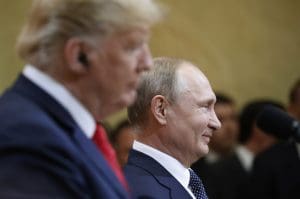US joins Russia, North Korea in refusing to sign cybersecurity pact
Once again, America is retreating from the global stage under Trump’s leadership. And once again, Russia stands to benefit from it.

More than 50 countries signed onto a historic cybersecurity pact Monday as part of the Paris Peace Forum, marking an important step forward in the global fight against cyberwarfare and criminal activity on the internet.
In addition to the governments that pledged to work together to combat malicious online activities, at least 150 tech companies and 90 charitable organizations and universities also signed onto the agreement.
However, there were a few notable absences from the list of signatories. Among the countries that declined to pledge support for the global pact were the repressive regimes of Russia, China, and North Korea — and the United States.
The agreement, known as the “Paris Call for Trust and Security in Cyberspace,” represents the largest and most coordinated effort to date to create a set of international laws and norms for cyberwarfare and security — akin to a Geneva Convention for the digital world.
French President Emmanuel Macron unveiled the initiative Monday, just a day after Trump refused to join other world leaders to commemorate the centenary of the end of World World I at a cemetery for fallen soldiers.
The cybersecurity pact — which calls for countries to work together to promote human rights on the internet, thwart malicious activities such as theft of intellectual property and trade secrets, and develop better methods to prevent foreign election interference — was supported by most modern democratic nations including Japan, Canada, and the countries of the European Union.
Tech companies like Facebook, Google, Microsoft, IBM, and HP also signed onto the agreement, pledging to accept more responsibility for bolstering cybersecurity and preventing abuses of their own products and services.
While the pact is meant to serve as a starting point for future, more comprehensive efforts, countries were asked to sign the document to signal their commitment and intent to cooperate with the agreement’s clauses.
The need for the international pact couldn’t be clearer. Current international law protecting civilians is founded on notions of state sovereignty and traditional methods of warfare, but the digital environment doesn’t respect or abide by international borders, and the information battlespace does not separate state actors and combatants from civilians.
Without rules and norms to define these matters in the digital environment, civilians can all too easily get caught in the crossfire of state-sponsored hacking, misinformation campaigns, and cyberattacks on critical infrastructure.
Just as the Geneva Convention specified rules of combat to protect civilian populations during wartime, the cybersecurity pact is meant to define what is unacceptable, and to provide a legal basis for punishing those who breach international rules and norms in the digital world.
It’s not clear why the United States chose to join some of the world’s most repressive regimes in refusing to sign the agreement, but it’s far from the first time America has split from its allies under the leadership of the Trump administration — and just like the previous times, Russia stands to benefit substantially from America’s retreat from the global stage.
The Kremlin regularly uses its cyber capabilities as tools of war, sometimes turning them against the Russian population, and at other times aiming at countries like Ukraine, Estonia, and, most recently, the United States. And in many instances, Russia has gotten away with these acts of aggression and human rights violations, in part because there is not even widespread agreement on the definition of cyberwarfare or the rules of engagement.
A new agreement like the one unveiled Monday would put the United States and its allies in a stronger position to mount a defense and hold Russia accountable for such acts. But, as the RAND Corporation warned in a 2017 report, “Without clear consensus on what constitutes a cyber violation, Russia will likely continue to maneuver unfettered in the vast gray area of international law,”
With the Trump administration continuing to make inexplicable decisions that benefit Russia with no apparent gains for the U.S., it’s not hard to see why so many people believe that Putin has a hold on Trump.
Unfortunately for the American people, that also means Putin has a hold on Trump’s decision-making — and despite what Trump may claim, there’s nothing “America First” about America retreating.
Published with permission of The American Independent Foundation.
Recommended

Biden campaign launches new ad focused on Affordable Care Act
Former President Trump has said he wants to do away with the popular health care law.
By Kim Lyons, Pennsylvania Capital-Star - May 08, 2024
Trump leaves door open to banning medication abortion nationwide
Donald Trump is planning to release more details in the weeks ahead about how his administration would regulate access to medication abortion, according to comments he made during a lengthy interview with Time magazine published Tuesday.
By Jennifer Shutt, States Newsroom - April 30, 2024
Biden on abortion rights: President expects to give speech Tuesday on new Florida 6-week ban
‘Having the president of the United States speaking out loud and with confidence about abortion access is a great thing’
By Mitch Perry, Florida Phoenix - April 22, 2024












































































